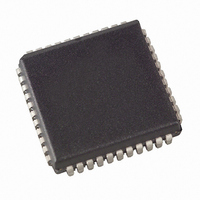AT89C51RE2-SLSUM Atmel, AT89C51RE2-SLSUM Datasheet - Page 156

AT89C51RE2-SLSUM
Manufacturer Part Number
AT89C51RE2-SLSUM
Description
MCU 8BIT FLASH 2.7-5.5V 44-PLCC
Manufacturer
Atmel
Series
89Cr
Datasheet
1.AT89C51RE2-SLSUM.pdf
(187 pages)
Specifications of AT89C51RE2-SLSUM
Core Processor
8051
Core Size
8-Bit
Speed
60MHz
Connectivity
I²C, SPI, UART/USART
Peripherals
POR, PWM, WDT
Number Of I /o
34
Program Memory Size
128KB (128K x 8)
Program Memory Type
FLASH
Ram Size
8K x 8
Voltage - Supply (vcc/vdd)
2.7 V ~ 5.5 V
Oscillator Type
External
Operating Temperature
-40°C ~ 85°C
Package / Case
44-PLCC
Package
44PLCC
Device Core
8051
Family Name
89C
Maximum Speed
40 MHz
Operating Supply Voltage
3.3|5 V
Data Bus Width
8 Bit
Number Of Programmable I/os
34
Interface Type
SPI/TWI/UART
Number Of Timers
3
Processor Series
AT89x
Core
8051
Data Ram Size
8 KB
Maximum Clock Frequency
40 MHz
Maximum Operating Temperature
+ 85 C
Mounting Style
SMD/SMT
3rd Party Development Tools
PK51, CA51, A51, ULINK2
Development Tools By Supplier
AT89OCD-01
Minimum Operating Temperature
- 40 C
Cpu Family
89C
Device Core Size
8b
Frequency (max)
40MHz
Total Internal Ram Size
8KB
# I/os (max)
34
Number Of Timers - General Purpose
3
Operating Supply Voltage (typ)
3.3/5V
Operating Supply Voltage (max)
5.5V
Operating Supply Voltage (min)
2.7V
Instruction Set Architecture
CISC
Operating Temp Range
-40C to 85C
Operating Temperature Classification
Industrial
Mounting
Surface Mount
Pin Count
44
Package Type
PLCC
For Use With
AT89OCD-01 - USB EMULATOR FOR AT8XC51 MCUAT89STK-11 - KIT STARTER FOR AT89C51RX2
Lead Free Status / RoHS Status
Lead free / RoHS Compliant
Eeprom Size
-
Data Converters
-
Lead Free Status / Rohs Status
Lead free / RoHS Compliant
Available stocks
Company
Part Number
Manufacturer
Quantity
Price
Company:
Part Number:
AT89C51RE2-SLSUM
Manufacturer:
HONEYWELL
Quantity:
101
OverRun Condition
Interrupts
156
AT89C51RE2
Figure 64. Mode Fault Conditions in Slave Mode
Note:
This error mean that the speed is not adapted for the running application:
An OverRun condition occurs when a byte has been received whereas the previous one has not
been read by the application yet.
The last byte (which generate the overrun error) does not overwrite the unread data so that it
can still be read. Therefore, an overrun error always indicates the loss of data.
Three SPI status flags can generate a CPU interrupt requests:
Table 114. SPI Interrupts
Serial Peripheral data transfer flag, SPIF: This bit is set by hardware when a transfer has been
completed. SPIF bit generates transmitter CPU interrupt request only when SPTEIE is disabled.
Mode Fault flag, MODF: This bit is set to indicate that the level on the SS is inconsistent with the
mode of the SPI (in both master and slave modes).
Serial Peripheral Transmit Register empty flag, SPTE: This bit is set when the transmit buffer is
empty (other data can be loaded is SPDAT). SPTE bit generates transmitter CPU interrupt
request only when SPTEIE is enabled.
Flag
SPIF (SPI data transfer)
MODF (Mode Fault)
SPTE (Transmit register empty)
Note: While using SPTE interruption for “burst mode” transfers (SPTEIE=’1’), the user soft-
ware application should take care to clear SPTEIE, during the last but one data reception (to
be able to generate an interrupt on SPIF flag at the end of the last data reception).
when SS is discarded (SS disabled) it is not possible to detect a MODF error in slave mode
because the SPI is internally selected. Also the SS pin becomes a general purpose I/O.
MOSI
SCK cycle #
SCK
(from master)
(from master)
MISO
(from slave)
SS
(slave)
1
z
0
1
z
0
1
z
0
1
z
0
0
MODF detected
MSB
Request
SPI Transmitter Interrupt Request
SPI mode-fault Interrupt Request
SPI transmit register empty Interrupt Request
0
MSB
MSB
1
MODF detected
B6
B6
2
B5
3
B4
4
7663E–8051–10/08

















